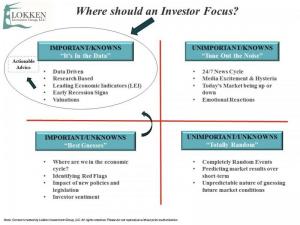2017 predictions
For what it's worth...
"It ain't what you don't know that gets you in trouble. It's what you know for sure that just ain't so." - Mark Twain
The consensus among Wall Street strategists is that 2017 will be a positive year for stock investors. Buoyed by an economy that was already gaining momentum prior to the presidential election and excited about the prospects of a pro-business Trump administration, the 10 investment strategists recently polled by the Wall Street Journal unanimously agreed that 2017 will be a good year.
The average prediction is for a 6 percent gain in the S and P 500, with the highest prediction being up 15 percent and the lowest predicting a gain of just 2 percent. I say "for what it's worth" because Wall Street strategists have shown a remarkable lack of creative thinking in their yearly predictions. Despite the fact that annual returns in stocks are historically very random in their distribution, the predictions over the past four years are almost identical. It's as if they just dusted off last year's predictions and presented them again as new.
Stock markets in the U.S. have averaged over the long term about a 9 percent annual return, but have also had a standard deviation (dispersion of returns) of about 20 percent.
Translation? In any given year, it has historically been normal for stocks to return anywhere between -11 percent and a robust +29 percent. At the start of every year, we should be ready for any return within this range. Where exactly the year ends up is, unfortunately, rather random, perhaps owing more to a reversion to mean than any other element.
In my opinion, we investors spend entirely too much time trying to predict how the market will perform over the next 12 months. That information might be valuable to an investor, but is entirely unknowable. If we are to be fact-based investors, we should spend less time evaluating unknowable outcomes, and more time studying knowable, important information. Fortunately, there is much of this available.
A few tips might help organize thoughts around what is important and knowable information, and what is not.
From my perspective, the knowable, important information we should focus on as we enter into 2017:
The current economic data in the U.S., including the important leading economic indicators, continue to point toward a growing and improving economy. A growing economy leads to higher corporate profits, which lead to potentially higher stock prices.
For stock investors, the incredibly good news is that I see no reason that long-term returns in the future will be materially different from historical average returns. Right around 9 percent. This good news, however, comes with the understanding that returns for any given year are essentially random. Neither I nor you can accurately predict the outcome for 2017.
What is almost entirely assured is that sometime in 2017 we will have a correction of somewhere between -5 percent and -10 percent. Since 1980, we have experienced an intra-year correction greater than 5 percent every year except 1995. Expect that this will happen in 2017.
Finally, do not become too excited, nor too discouraged, by the current political environment. Presidents and politicians come and go, to little apparent effect on the long-term prospects for investors.
Jonathan Lokken, CIMA is managing principal of Lokken Investment Group LLC in Lewes. To submit a question for consideration in the next Q and A column, email jlokken@lokkeninvest.com.
Disclaimer: The foregoing content reflects the opinions of Lokken Investment Group LLC and is subject to change at any time without notice. Content provided herein is for informational purposes only and should not be used or construed as investment advice or a recommendation regarding the purchase or sale of any security. There is no guarantee that these statements, opinions or forecasts provided herein will prove to be correct. Past performance is not a guarantee of future results. All investing involves risk. Asset allocation and diversification does not ensure a profit or protect against a loss.
























































